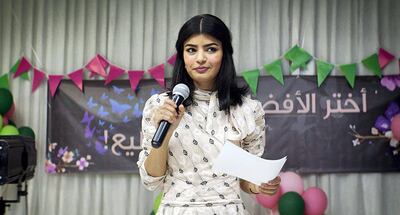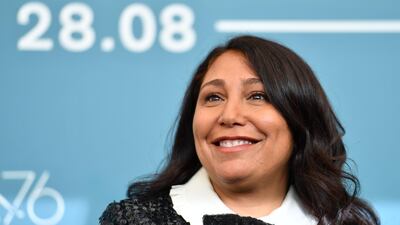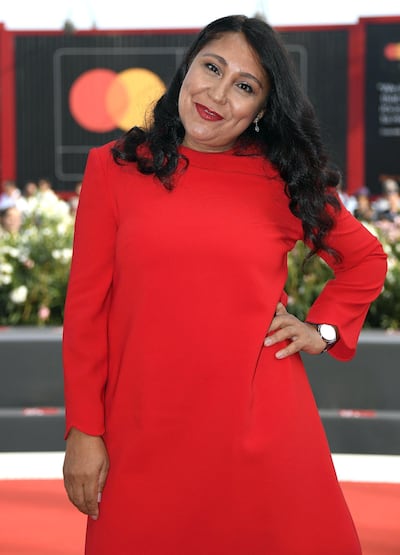Sitting in the plush Excelsior Hotel, Haifaa Al-Mansour is a little overwhelmed. Her film, The Perfect Candidate, starring Mila Alzahrani, has just played in competition at the Venice Film Festival.
“To see Saudi actresses on the red carpet with those flowing dresses, wandering around, was very touching,” she says. “To go there and have that moment in the spotlight with photographers … I felt very touched that they were able to do that.”
Al-Mansour is no stranger to firsts, though, with her 2012 film Wadjda the first feature film to be shot entirely inside the kingdom of Saudi Arabia. She's since made literary biopic Mary Shelley, starring Elle Fanning, but now she's back with another landmark work. In The Perfect Candidate, Alzahrani plays Maryam, a doctor whose decision to run for local office causes consternation in her Saudi community. It is the only film from the region to be running in competition with 20 other international films.
"I'm sure," says Al-Mansour, "there are a lot of conservative people who don't want to see a leading female star, a woman making films, and a woman doing a film about politics!"
'Change should come so it is deep, not on the surface'
The director, who has lived with her husband Brad Niemann in Los Angeles for the past five years, has no wish to take potshots at Saudi society. “I am a filmmaker who really respects where I come from. I know that it is conservative, politically, traditionally and religiously … but how can we make those boundaries wider every day? We try to just push the margins a little bit, so people can attempt debate and we have a bigger space for artists. I think change should come so it is deep, not on the surface.”
Since she took Wadjda to the Venice Film Festival, where it took three prizes and later went on to receive a prestigious Bafta nomination in the UK, Al-Mansour's mission for change hasn't always been popular. She's been attacked on social media, she says.
“They want to create a different narrative, that women should not be making films. You get a lot of things like that.” Does she ever engage with the trolls? “No. I’m a mother and I have two kids,” she says. “I don’t have time … I have proper things to do!”
Al-Mansour has high hopes for Saudi society
Even so, Al-Mansour is hopeful about changes in her homeland. “I think the Saudi society is moving forward, regardless. The social liberties are changing, especially for a woman – they can travel, they can drive, they can vote, they can even run for an office. But would people really vote for them? How will the public think? How will people in the street see them? That is a very important question. It’s creating that narrative – yes, you should go and vote for women. You should really trust women and women can be leaders.”

With The Perfect Candidate the first film to be supported by the newly formed Saudi Film Council, Al-Mansour was also one of three women appointed to a 13-member board of the General Authority for Culture to oversee cultural and artistic development in Saudi Arabia.
“I was really passionate about empowering young Saudi filmmakers and giving them a chance to grow,” she explains. “And that is happening – they’re getting funds for Saudi films.”
But despite her high profile, Al-Mansour's script for The Perfect Candidate still had to go through the usual checks and balances. She returned to Saudi Arabia to film, expecting some resistance to the movie topic – but found it relatively easy to get the green light.
“It was bureaucratic more than anything. You go to a place, apply, wait for the approval … you have to go to the system.
"I felt this [film] was pushing the boundaries. It was about a woman running for an office. I thought maybe there would be notes on the script, but I didn’t get any notes. I was like ‘Right, let’s make this movie!’”
What a Venice premiere means for Saudi cinema
When it came to casting her lead, Mansour chose Alzahrani, the rising TV star who made her mark as a boxing champion in the Saudi drama Boxing Girls. The director calls her "low-maintenance", referring to one scene outside the local hospital when Alzahrani had to traipse through the mud.
“She lost her shoe, and stepped on glass. And she didn’t stop or anything. At the end, she said, ‘I think there’s something [in my foot] …’ I’m like, ‘You’re bleeding!’ That commitment is admirable and really needed!”
As for Venice, Al-Mansour has arrived as just one of two female film directors in competition. The other is Australian filmmaker Shannon Murphy, for her film Babyteeth. But while festival director Alberto Barbera has come in for some heavy criticism for the lack of female representation, Al-Mansour argues that it isthe male-dominated industry that is preventing women getting behind the camera.
“I see my female friends, amazing directors, go to the Sundance Film Festival with amazing films and it’s 10 years before they get another film. Why? We have to give those women a chance to grow.”
Fortunately for Al-Mansour, she's broken through the proverbial glass ceiling. She's next turning to television, shooting an episode of The Good Lord Bird, a "beautifully written" slavery drama, adapted from the James McBride novel, starring Ethan Hawke. But what about Saudi Arabia? Will she continue to return in the future to tell home-grown stories? "Yeah," she says. "It's important to go back and continue the dialogue."


